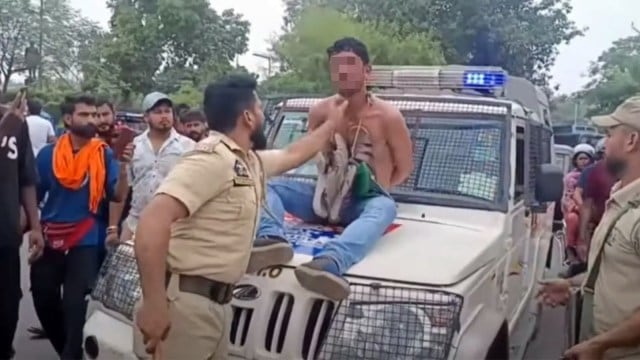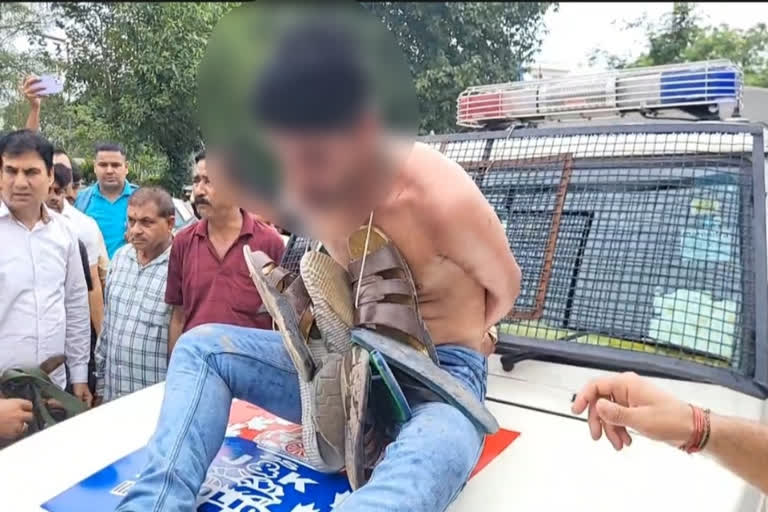A Viral Video That Shook Public Conscience
By: Javid Amin | Srinagar | 25 June 2025
A disturbing video that surfaced from Bakshi Nagar, Jammu, has sparked outrage across Jammu & Kashmir and India, revealing the inhumane treatment of a 24-year-old man from Baramulla. The man, later identified as Ishraq Ahmed from Uri, was seen shirtless, hands tied, wearing a garland of slippers, and seated on the bonnet of a police vehicle. This grotesque public shaming, carried out in broad daylight, has raised urgent concerns over mob justice, custodial misconduct, and police complicity.
The video spread rapidly on social media platforms, drawing condemnation from civil rights activists, legal experts, journalists, and citizens alike.

The Incident: What We Know So Far
According to preliminary police reports, Ishraq Ahmed was accused of theft, allegedly of Rs 40,000. The victim of the theft reportedly identified him and, along with a group of locals, detained and publicly humiliated the accused before the police arrived. However, multiple videos show uniformed personnel present during the parade, with no visible intervention.
Inspector Azad Manhas, the SHO of Bakshi Nagar police station, claimed the mob had “overpowered the officers” and that the police had no part in the parade. However, this explanation has failed to convince the public, especially as officers can be seen walking beside the vehicle, apparently condoning or even facilitating the act.
SSP’s Response: Condemnation and Departmental Inquiry
In response to the uproar, Senior Superintendent of Police (SSP) Joginder Singh issued a strong statement condemning the act, calling it “unprofessional” and “unbecoming of a disciplined organisation.” He announced a departmental inquiry and instructed the SDPO City North to submit a report within a week.
However, critics argue that internal inquiries rarely result in meaningful accountability, especially when evidence of police presence during the act is so apparent.
Human Rights Perspective: Rule of Law in Jeopardy
Human rights organizations and civil society groups have condemned the incident in strong terms. Nasir Khuehami of the J&K Students’ Association remarked, “Police are not mobs. They are the custodians of the law.” He further warned that such spectacles erode public trust in law enforcement and can push democracies toward lawlessness.
Legal experts have pointed out that even if the accused was guilty, the due process of law must prevail. Public humiliation is a violation of the right to dignity under Article 21 of the Indian Constitution.
The Bigger Picture: Regional Identity and Discrimination
This incident has reignited fears around discrimination against Kashmiris in Jammu, especially among students, migrants, and workers who already face heightened scrutiny and hostility.
Activists have drawn parallels to past episodes where Kashmiris have been subjected to collective punishment or vigilante-style justice, raising uncomfortable questions:
- Would this have happened if the accused wasn’t from Kashmir?
- Is there an institutional failure in protecting minority identities in Jammu?
- Are such acts normalized when directed against certain communities?
Political Silence and Media Response
The muted response from mainstream political parties has also drawn criticism. While some opposition leaders have condemned the act, no senior government figure has issued a statement as of yet.
The national media’s delayed and minimal coverage further compounds the issue. It raises concerns about selective outrage and editorial gatekeeping, especially when incidents involve marginalized communities.
Legal and Ethical Implications
Even if police claim the parade was mob-driven, their duty is to protect all individuals, including the accused. Under Indian law:
- Section 354 IPC prohibits public humiliation and indecent behavior
- Section 330 IPC criminalizes acts of torture or degrading treatment
- The D.K. Basu Guidelines, laid down by the Supreme Court, clearly define how arrests must be carried out
The participation—or even passive presence—of police during the humiliation of Ishraq Ahmed could amount to gross violation of custodial ethics and constitutional law.
Social Media and Civil Society: Demanding Accountability
Hashtags like #JusticeForIshraq, #EndMobJustice, and #PoliceReformNow have trended on Twitter and Instagram, signaling public demand for:
- Suspension of involved officers
- A time-bound judicial inquiry
- Compensation and apology to the victim
- Training in human rights and custodial ethics for police personnel
A Call for Broader Police Reforms
This incident is not an isolated one. Across India, there have been numerous cases of:
- Mob lynchings
- Custodial deaths
- Fake encounters
- Public shaming by police in the name of deterrence
Experts argue that without systemic police reforms—including greater transparency, civilian oversight, and accountability mechanisms—such violations will persist.
Bottom-Line: Justice Must Be Seen and Served
The public shaming of a Kashmiri man in Jammu isn’t just about one individual. It’s about the kind of society we are becoming—where mobs take law into their own hands, and state institutions either fail or choose to stay silent.
The Jammu police must be held accountable, not only for their presence during the incident but also for what it symbolizes: a breakdown in the chain of command, of morality, and of the very rule of law they are sworn to uphold.
Justice for Ishraq Ahmed is not just a demand. It is a litmus test for India’s democratic values, its policing culture, and its collective conscience.
Let this not be another case that fades from memory. Let it be a turning point.



